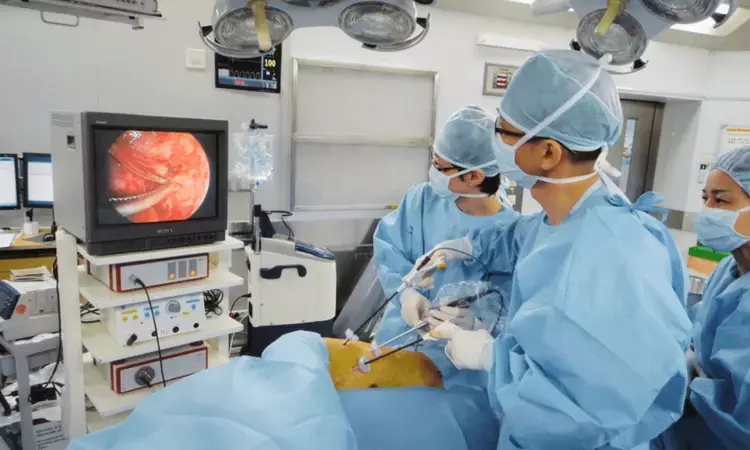- Home
- Medical news & Guidelines
- Anesthesiology
- Cardiology and CTVS
- Critical Care
- Dentistry
- Dermatology
- Diabetes and Endocrinology
- ENT
- Gastroenterology
- Medicine
- Nephrology
- Neurology
- Obstretics-Gynaecology
- Oncology
- Ophthalmology
- Orthopaedics
- Pediatrics-Neonatology
- Psychiatry
- Pulmonology
- Radiology
- Surgery
- Urology
- Laboratory Medicine
- Diet
- Nursing
- Paramedical
- Physiotherapy
- Health news
- Fact Check
- Bone Health Fact Check
- Brain Health Fact Check
- Cancer Related Fact Check
- Child Care Fact Check
- Dental and oral health fact check
- Diabetes and metabolic health fact check
- Diet and Nutrition Fact Check
- Eye and ENT Care Fact Check
- Fitness fact check
- Gut health fact check
- Heart health fact check
- Kidney health fact check
- Medical education fact check
- Men's health fact check
- Respiratory fact check
- Skin and hair care fact check
- Vaccine and Immunization fact check
- Women's health fact check
- AYUSH
- State News
- Andaman and Nicobar Islands
- Andhra Pradesh
- Arunachal Pradesh
- Assam
- Bihar
- Chandigarh
- Chattisgarh
- Dadra and Nagar Haveli
- Daman and Diu
- Delhi
- Goa
- Gujarat
- Haryana
- Himachal Pradesh
- Jammu & Kashmir
- Jharkhand
- Karnataka
- Kerala
- Ladakh
- Lakshadweep
- Madhya Pradesh
- Maharashtra
- Manipur
- Meghalaya
- Mizoram
- Nagaland
- Odisha
- Puducherry
- Punjab
- Rajasthan
- Sikkim
- Tamil Nadu
- Telangana
- Tripura
- Uttar Pradesh
- Uttrakhand
- West Bengal
- Medical Education
- Industry
Partial Cardiac Denervation Reduces Postoperative Atrial Fibrillation Risk After CABG: pCAD-POAF trial

China: A recent clinical trial has demonstrated that partial cardiac denervation (pCAD) is an effective strategy for reducing the incidence of postoperative atrial fibrillation (POAF) in patients undergoing isolated coronary artery bypass grafting (CABG). The findings from the pCAD-POAF Randomized Clinical Trial, published in JAMA Cardiology, suggest that this innovative approach may be a valuable tool for cardiac surgeons aiming to minimize this common and challenging complication.
POAF, a frequent issue after cardiac surgery, is associated with increased morbidity, prolonged hospital stays, and higher healthcare costs. Despite the availability of medications and other preventive measures, managing POAF remains a significant clinical challenge. Therefore, effective strategies to prevent postoperative atrial fibrillation after coronary artery bypass grafting remain a clinical necessity. Considering this, Ziang Yang, Chinese Academy of Medical Sciences and Peking Union Medical College, Beijing, China, and colleagues aimed to evaluate whether partial cardiac denervation, performed by severing the ligament of Marshall (LOM) and removing the fat pad along the Waterston groove, can effectively lower the risk of POAF in patients undergoing CABG.
For this purpose, the researchers conducted a single-center, randomized clinical trial in China, enrolling adult patients scheduled for isolated CABG between August 15, 2022, and December 13, 2023. Follow-up visits occurred 30 days after discharge. Participants were randomly assigned to either the intervention group (CABG plus partial cardiac denervation) or the control group (CABG only) in a 1:1 ratio. All participants were closely monitored for the occurrence of postoperative atrial fibrillation (POAF) until six days after the surgery.
The primary outcome was the incidence of POAF within six days, defined as a supraventricular arrhythmia lasting more than 30 seconds.
The trial revealed the following findings:
- The trial enrolled 430 patients, with a mean age of 61.9 years, including 18.4% females.
- The 6-day incidence of POAF was significantly lower in the intervention group (18.1%) than the control group (31.6%), with a risk ratio of 0.57.
- A sensitivity analysis using Kaplan-Meier survival curves further confirmed this reduction in POAF occurrence (hazard ratio, 0.53).
- Safety assessments showed no significant differences between the two groups, and the intervention group had reduced postoperative medical costs.
This randomized controlled trial found that partial cardiac denervation, achieved by cutting the LOM and removing the fat pad along the Waterston groove, effectively reduced the occurrence of POAF after isolated CABG.
"These findings suggest that partial cardiac denervation could be a viable option for cardiac surgeons to consider in reducing the risk of POAF following CABG," the researchers concluded.
Reference:
Yang Z, Tiemuerniyazi X, Xu F, et al. Partial Cardiac Denervation to Prevent Postoperative Atrial Fibrillation After Coronary Artery Bypass Grafting: The pCAD-POAF Randomized Clinical Trial. JAMA Cardiol. Published online November 17, 2024. doi:10.1001/jamacardio.2024.4639
Dr Kamal Kant Kohli-MBBS, DTCD- a chest specialist with more than 30 years of practice and a flair for writing clinical articles, Dr Kamal Kant Kohli joined Medical Dialogues as a Chief Editor of Medical News. Besides writing articles, as an editor, he proofreads and verifies all the medical content published on Medical Dialogues including those coming from journals, studies,medical conferences,guidelines etc. Email: drkohli@medicaldialogues.in. Contact no. 011-43720751


